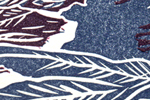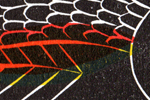Winter 2016: Prose
Scarab Man
Fiction by Cynthia McGean
The first time Cecile saw the Scarab Man she was walking back from Zupan’s carrying a bag of single portion meals and herbal teas. Rey’s death had vaporized half her world and, after a month in Portland, she hadn’t yet adjusted to solo living, her brain still molded by twenty years of shared existence. Shopping was an excuse to escape the deafening emptiness of the apartment.
She should have chosen a different store. The endless assortment of exotic sauces and inscrutable grains conjured Rey’s presence too vividly, invoking his love of quinoa and pad thai and tabouleh, foods whose foreign-sounding names Cecile had never even heard until she met him. She took refuge in the frozen food section and counted out six individual servings of Lean Cuisine chicken teriyaki, hoping the prepackaged food would reduce the chance of leftovers leering at her through their Tupperware masks.
The wine aisle was a chorus of cruel reminders. Rey had perused wine labels the way an art critic perused paintings. The clever and beautiful ones that always spoke to him called out now to Cecile in plaintive tones of empty seduction. “Never drink alone, Cecile.” That’s what Rey would say. She hurried to the tea shelves, where she grabbed one box each of Rose-hip Renewal and Celestial Comfort.
In the checkout line, she kept her eyes on the merchandise to avoid conversations, then, on a sudden impulse, picked up a bar of dark gourmet chocolate laced with sea salt and crystallized ginger. The indulgence pushed the total cost beyond what she'd planned. She'd have to pay with a card. The idea made her queasy. Since Rey's death, she'd taken to paying cash so she would owe no debts to the future.
She bought the chocolate anyway and ate it the moment she left the store. The dark mix of sugar and spice pricked her senses awake. She found herself noticing the fresh mist on her cheeks and the wet sheen of crimson on a nearby maple tree. But after the first defiant bites, the thrill faded. She finished off the treat in a furtive hurry, hiding her face behind her grocery bag.
As she wiped the last bittersweet remnants from her lips, the Scarab Man loomed into view — head down, shoulders hunched, knees working like pistons. He was tall, easily six feet, with a permanent shrug to his shoulders and a great oblong beetle-like torso that rolled back and forth atop two skinny heron legs. He pushed an old shopping cart covered with a tattered black tarp; the whole thing exuded the ominous energy of a ghostly pirate ship on the prowl. A straggly curtain of beard swung from his chin. He fixed his searchlight eyes on Cecile. She froze. For one chasm of moment, neither of them moved.
Why on earth didn’t she just look away? Wasn’t that what Rey had always told her? “Don’t make eye contact; don’t give them any money.” How she missed that foxhole mentality of his.
“Your time is near,” the Scarab Man growled.
Cecile threw off her trance and ran. The bag of groceries slipped through her arms and burst open on the sidewalk, scattering her carefully chosen items into the street. She hesitated. A car plowed through the frozen entrees. The Scarab Man and his cart bore down on her. She didn’t stop again until she’d covered the five blocks to her apartment.
Inside, she locked the door. The slow rattling grind of the Scarab Man’s shopping cart passed beneath her window. His words repeated inside her with sickening familiarity. “Your time is near.” That very fear had echoed in her gut every day since Rey’s heart attack — mortality hanging over her like an old tree with rotten roots.
Cecile told herself the Scarab Man was just another specter of her anxiety and loneliness. The move to Portland was supposed to fix all that — no old reminders lurking at every corner to ambush her with grief. When she was twenty, starting over had been as exhilarating as a naked dive into a cold mountain lake. In her late forties, it was more like stepping into a winter downpour without an umbrella.
That night, Cecile dreamt the Scarab Man came to take her away. His thick hands dragged her down into a garbage pit surging with hidden life that wriggled into her eyes, her nose, her mouth. She jolted awake, drenched in sweat, and grasped for the warm, snoring comfort of Rey beside her. The yawning absence on the other half of the mattress sent its cold shock through her, as it did every night now. She shivered as she flicked on the lamp. Wrapping the bedspread around her shoulders, she turned on every light in the apartment, crept towards the kitchen, and poured herself a glass of wine to slow her rabbiting heart. She kept vigil with the TV until dawn.
* * *
The following week, Cecile took herself to dinner at Higgins, a Top Choice restaurant in her Fodor’s travel guide. When she moved, she had promised herself a fancy night out every week, approaching her loneliness with the practical, methodical fortitude she applied to doing her taxes. She sat by herself at a table for two. She would have invited a friend, but she didn’t have any in Portland. With Rey, it didn’t matter that they’d never had kids, never put down roots. He could spin any gathering into a world of conviviality. Without him, Cecile was left to face her social inadequacy alone.
Her reflection in the dark restaurant window unsettled her — her mother in exhausted middle-age. As she shifted her focus to the outside world, two eyes swooped in from the night with hawk-like ferocity. The Scarab Man stared back at her through her own face in the glass.
Cecile gasped. She jumped from her seat, spilling her wine across the silver-grey table cloth.
The waiter appeared at her elbow. “Is there a problem, ma’am?”
My husband is dead. My world fell apart. “That.” She pointed to the window. “There.”
An implacable blackness stared back, dotted only with the reflected candlelight of the restaurant.
The waiter cocked his head, a patronizing smile poised on his lips. “Shall I bring you another glass?”
Cecile’s shoulders gave in first. Then the rest of her succumbed, sinking back into the chair. “No,” she said. “Just the check."
* * *
The third time the Scarab Man showed up, Cecile had gone to the ballet for her birthday. The show was “Swan Lake.” Rey would’ve hated it. He thought classical ballet's stylized gestures lacked passion and truth. He preferred contemporary dance. Cecile meant the outing to be a declaration of sorts: I am a strong, independent woman because I go to the ballet alone.
She found herself watching the evil sorcerer of the piece, who held everyone in thrall with his enchantments. As he lunged across the stage, dry-ice fog swirling around his ragged cape and powerful thighs, Cecile couldn’t help shuddering. She kept grabbing for Rey’s hand and startling the ancient gentleman in the seat next to her. His wife sat beside him, both of them cruelly blessed with white hair, wrinkles, and liver spots, the signs of a shared old age. After the man pulled his hand away from Cecile for the third time, he and his wife traded seats. The woman nestled her head into her husband's chest. For the rest of the act, Cecile clasped her own hands.
At intermission, Cecile stayed in the auditorium to avoid the social groupings in the lobby — families with children, clusters of friends, countless couplings. She buried herself in the program, reading the dancers’ biographies as if they were obituaries.
After the show, the crowds dissipated within one block of the theater, pouring into parking garages on their way to minivans that would take them out to the well-lit, well-fed, family-filled suburbs. The streets went dark, as though unseen stagehands had shut down all the city lights at one stroke. Cecile hurried on foot towards her apartment.
From around the corner came the rattle of a thousand distant inmates shaking the bars of a thousand distant cages. The Scarab Man crossed her path. As he hefted his cart off the curb, he snarled, “Your time is near." When he reached the middle of the street, he stopped, one foot forward and one foot back, a wind-up toy that had run out of juice.
A bus came round the corner in squealing slow motion. The Scarab Man didn’t even flinch. He was permanent, immoveable. Panic rose in Cecile’s throat. She imagined the front end of the bus buckling on impact as if it had hit a steel girder, the Scarab Man’s shape carving its way through the metal, dismembering the people on the bus, the man and his cart still standing when the last gut-wrenching screech of mangled machine had died away.
“Look out!” she screamed. She ran into the street.
Suddenly purposeful, without even a glance in her direction, the Scarab Man rattled out of the path of the bus and up onto the opposite curb.
Stunned, Cecile almost missed the blare of the bus horn but heard the driver's parting scream — “Get outta the street, lady! What’s the matter with you?”
From an alley on the other side, the Scarab Man turned and looked right at her. His trash bag cape pirouetted in the wind. Wild tentacles of hair lashed at his face from beneath his black knit cap. His lips moved, silently forming words. He rolled his cart down the alley, that slow, rattling grind tracing his path.
Cecile decided to follow him. She wanted to turn the tables, to pull back the curtain on fate. The Scarab Man had haunted her; now she would haunt him. Rey would have called her crazy.
The Scarab Man didn’t seem to care that he was followed. Cecile kept her distance anyway, down one shadowy side street and then another. She matched his rolling gait stride for stride. With each step, her ghost of a life felt more distant, a fog-shrouded shore she had left in her wake.
The Scarab Man was a full block ahead of her. The city’s night life unrolled behind him, groups and couples drifting into the doorways of restaurants, neon bar signs blinking on, street lights bumping up their brightness. Scarab Man’s pace didn’t slacken. What if he never stopped, wheeling his cart in an endless route from one side of the city to the other, transforming day into eternal night? A memory of fear stirred in Cecile’s ribs.
They entered the shut-down belly of the city, a lifeless realm where wide sheets of ribbed steel hid the inner worlds of underground parking, where headless mannequins in phantom fashions stood sentinel, frozen in meaningless gestures, and insect-shaped trinkets glittered in jewelry store windows behind rusted nets of hinged metal. A sterile blue and white glow emanated from the windows of the grey, faceless office buildings. It wouldn’t matter if the Scarab Man never stopped. He’d collected her soul in the flotsam and jetsam of his cart and, whatever happened next, she had to follow.
They drew closer to the river. The storefronts and office buildings gave way to bridges and overpasses that looped one upon the other in a concrete canopy above the streets and sidewalks. At the edge of the water, two rows of columns supported an arching roadway. On one end, where the road overhead angled down to a slanted ceiling, a great mound of scrap metal and gravel reared up from the ground, as if someone had disemboweled the city and left the innards there for a warning. The smell of excrement lingered over the mud-sogged pavement. At the other end of the columns rose the river, its murky surface writhing with tortured undercurrents.
The Scarab Man wheeled his cart right to the water’s edge. A puce metal railing stood between him and the river. The night breeze rose to a gusting wind, sending the Scarab Man's hair, beard and cape streaming behind him. The sharp profile of his nose pointed to some unseen place across the water. He was the captain of the ship, its figurehead, and the ship itself, all in one.
He lifted the tarp on his shopping cart. From beneath its folds, he hauled out a dark, lumpy form broader than his own shoulders. He held the thing up over his head in his two hands like an offering to the gods. It was the right size for a young child.
He turned, arms upraised and full. An icy certainty pierced Cecile's marrow. Your time is near.
A slash of headlights from the overpass lit up the shape in his hands — the battered carcass of a raccoon.
The Scarab Man flung his burden with furious vehemence into the river. There was a huge splash, a glugging, a gurgling. Cecile rushed to the railing and watched the last tip of the raccoon's ringed tail sink beneath the surface as its heavy shape drifted into deep obscurity.
Scritch. Hiss.
Cecile looked back. The Scarab Man held a lighted match. The flame swayed with his breath. He dropped it into the river. The light flared on the water, its fragile bloom balancing longer than seemed possible. In another instant, faster than a gasp, it was gone.
The Scarab Man lit another match. He pinched it between his finger and thumb like a precious coin and held it out to Cecile. The white intensity of the flame danced towards her.
I’m crazy, she thought. Or dead.
She took the match. She held it until the fire singed her fingertips. When she could bear the burning heat no longer, she let go. It fell to the water. The flame sprang up one last time and disappeared.
Or it should have disappeared. At the very spot where the match had landed, a golden glow pooled beneath the surface of the water. It grew brighter, spreading fingers up and out from below the water line until the whole river was lit with the liquid brilliance of a sunrise seen through melting ice. A magnificent spectrum of lights shot up along the overpass and across the span of freeway that connected one side of Portland with the other.
The Scarab Man rolled his cart away.
At the foot of the overpass, Cecile lifted her face to the dawn.
| |

|

|
 |
 |
 |
 |
 |
||||
|
Celebrating nature, home and the cycles of life – twenty poets light the winter night. |
Six stories use magic to explore loss, grief and healing. |
With imagery of flora and fauna, four artists animate the winter landscape. |
Five young women dig deep to each speak their individual truth . |
From emerging to established writers – meet the women behind our eighth issue’s voices and visions. |

|
LETTER FROM THE MANAGING EDITOR
POETRY Northwest Equinox by Kris Demien Gradations of Gray by Wendy Thompson With Gladness by Sara Graves Home by Leora Marialicia González For a Grade School Classmate by Joan Maiers Canning Factory Road by Elizabeth Stoessl To Make a Prairie by Carolyn Martin At Home by Suzy Harris Family Disagreement by Tricia Knoll The Bullfrogs by Katherine Boyer Cows by Rebecca Jamieson Lesson by Stacey Vallas Stardust by Erin Iwata Perspective by Carolyn Martin Lacrosse Season by Elizabeth Harlan-Ferlo The Tangled Path by Suzanne LaGrande Matched Set by Tanya Jarvik False Bus Stop by Elizabeth Harlan-Ferlo Last Visit by Erin Iwata October Walk with My Mother by Ann Sinclair First Rothko Exercise by Elizabeth McLagan Fractions by Susan Blackaby Tea by Melineh Yemenidjian Return by Stacey Vallas PROSE Scarab Man by Cynthia McGean Planetary Influences by Alida Thacher Bone of the Past by Burky Achilles Teachings: A Buddhist Ghost Story by Ann Sihler Wrangler by Desiree Wright A Nicaraguan Spring by Pamela Russell Bejerano FEATURED ART Into the Wonder by Annamieka Hopps Davidson Deep Blue Meditation by Annamieka Hopps Davidson Weave Me Into the Sea by Annamieka Hopps Davidson Crassula 2 by Alison Foshee Crassula 5 by Alison Foshee Crassula 6 by Alison Foshee Warm Autumn by Tamar Hammer Girl with Conch by Tamar Hammer With Her Dog by Tamar Hammer YOUNG VOICES Love Beyond Loss by Isabel Lickey Submerged by Raimy Khalife Hamdan Which Way? by Alli Rodenbaugh To Autumn by Sara Barkouli The Storm by Elie Doubleday CONTRIBUTORS |
